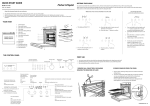Download Fisher & Paykel OB60S9DE User's Manual
Transcript
Multifunction oven OB60S9DE models Installation instructions and User guide NZ AU GB IE SG Contents Safety and warnings Installation instructions Introduction The control panel Setting the clock and first use Using your oven Oven functions Using the timer Automatic cooking Baking chart User preference settings Sabbath setting Care and cleaning Troubleshooting Alert codes Warranty and service Important! SAVE THESE INSTRUCTIONS The models shown in this user guide may not be available in all markets and are subject to change at any time. For current details about model and specification availability in your country, please visit our local website listed on the back cover or contact your local Fisher & Paykel dealer. 1 2 5 10 11 12 13 14 16 17 19 20 22 24 35 37 38 2 Safety and warnings Installation WARNING! Electrical Shock Hazard Always disconnect the appliance from the mains power supply before carrying out any maintenance or repairs. Connection to a good earth wiring system is essential and mandatory. Alterations to the domestic wiring system must only be made by a qualified electrician. Failure to follow this advice may result in death or electrical shock. WARNING! Fire Hazard Do not use adapters, reducers, or branching devices to connect this appliance to the mains power supply. Failure to follow this advice may result in overheating, burning, or fire. WARNING! Cut Hazard Take care - panel edges are sharp. Failure to use caution could result in injury or cuts. Important safety instructions To avoid hazard, follow these instructions carefully before installing or using this appliance. Please make this information available to the person installing the appliance - doing so could reduce your installation costs. This appliance must be installed and connected to the mains power supply only by a suitably qualified person according to these installation instructions and in compliance with any applicable local building and electricity regulations. Failure to install the appliance correctly could invalidate any warranty or liability claims. Safety and warnings Operation Your oven has been carefully designed to operate safely during normal cooking procedures. Please keep the following safety instructions in mind when you are using it: WARNING! Electrical Shock Hazard Disconnect the oven from the power supply before replacing the oven light bulb. Failure to follow this advice may result in death or electrical shock. WARNING! Fire Hazard Do not place aluminium foil, dishes, trays, water or ice on the oven floor during cooking, as doing so will irreversibly damage the enamel; lining the oven with aluminium foil may even cause fire. Never use your appliance for warming or heating the room. Persons could be burned or injured or a fire could start. Storage in or on appliance: flammable materials should not be stored in an oven or near its surface. Failure to follow this advice may result in overheating, burning, and injury. WARNING! Hot Surface Hazard Accessible parts may become hot when in use. To avoid burns and scalds, keep children away. Use oven mitts or other protection when handling hot surfaces such as oven shelves or dishes. Use care when opening the oven door. Let hot air or steam escape before removing or replacing food. Do not touch heating elements or interior surfaces of the oven. Heating elements may be hot even though they are dark in colour. Interior surfaces of an oven become hot enough to cause burns. During and after use, do not touch, or let clothing or other flammable materials contact heating elements or interior surfaces of the oven until they have had sufficient time to cool. Other surfaces of the appliance may become hot enough to cause burns among these surfaces are the oven vent, the surface near the oven vent, and the oven door. Failure to follow this advice could result in burns and scalds. WARNING! Cut Hazard Take care - some edges are sharp. Failure to use caution could result in injury or cuts. 3 4 Safety and warnings Important safety instructions To reduce the risk of fire, electrical shock, injury to persons, or damage when using the oven, follow the important safety instructions listed below: Read all the instructions before using the oven. Use the oven only for its intended purpose as described in these instructions. Proper installation: be sure your appliance is properly installed and earthed by a qualified technician. Isolating switch: make sure this oven is connected to a circuit which incorporates an isolating switch providing full disconnection from the power supply. Household appliances are not intended to be played with by children. Do not leave children alone. Children should not be left alone or unattended in the area where the appliance is in use. They should never be allowed to sit or stand on any part of the appliance. Children or persons with a disability which limits their ability to use the appliance, should have a responsible person to instruct them in its use. The instructor should be satisfied that they can use the appliance without danger to themselves or their surroundings. Do not place heavy objects on the oven door. Wear proper apparel. Do not wear loose fitting or hanging garments when using the appliance. They could ignite or melt if they touch an element or hot surface and you could be burned. User servicing: do not repair or replace any part of the appliance unless specifically recommended in the manual. All other servicing should be referred to a qualified technician. Do not use water on grease fires. Smother the fire or flame or use a dry chemical or foam type extinguisher. Use only dry oven mitts or potholders. Moist or damp potholders on hot surfaces could result in burns from steam. Do not let potholders touch hot areas or heating elements. Do not use a towel or a bulky cloth for a potholder. It could catch fire. Do not heat unopened food containers. They can build up pressure that may cause the container to burst and result in injury. Safe food handling: leave food in the oven for as short a time as possible before and after cooking. This is to avoid contamination by organisms which may cause food poisoning. Take particular care during warm weather. Always keep oven vents unobstructed. Do not operate your appliance by means of an external timer or separate remote-control system. If the power supply cable is damaged, it must be replaced by the manufacturer, its service agent or similarly qualified person in order to avoid a hazard. Under unfavourable electrical supply conditions, the appliance may cause temporary voltage drops. Installation instructions I I C E I K B 5 J J I L D A 16-20 mm H L F G 2.5 mm Installation diagrams for illustration purposes only Fig. 1 Product and cabinetry dimensions A B C D E F G H I II J JI K L overall height* of product overall width of product overall depth of product (excluding handle and knobs) height of chassis width of chassis depth of chassis depth of oven frame and control panel (=distance between front of chassis and front of oven door, excl. knobs) depth of oven door when fully open (measured from front of control panel) minimum inside width of cavity overall width of cavity inside height of cavity overall height of cavity minimum inside depth of cavity flush fitting cabinetry clearance Note: If installing a cooktop above the oven, ensure adequate clearance is provided for the cooktop as per the cooktop manufacturer’s instructions. *All height measurements include mounted feet. OB60S9DE Product and cabinetry dimensions (mm) 597 595 567 582 556 545 22 435 560 600 585 600 550 22 6 Installation instructions Before you install the oven, make sure that the benchtop and oven cavity are square and level, and are the required dimensions the installation will comply with all clearance requirements and applicable standards and regulations a suitable isolating switch providing full disconnection from the mains power supply is incorporated in the permanent wiring, mounted and positioned to comply with the local wiring rules and regulations. The isolating switch must be of an approved type and provide a 3 mm air gap contact separation in all poles (or in all active [phase] conductors if the local wiring rules allow for this variation of the requirements) the isolating switch will be easily accessible to the customer with the oven installed there is at least 1.5 m (and not more than 2 m) free length of power supply cable within the cavity for ease of installation and servicing the oven connection socket (if fitted) is outside the cavity if the oven is flush to the rear wall the oven will rest on a surface that can support its weight the height from the floor suits the customer you consult local building authorities and by-laws if in doubt regarding installation. When you have installed the oven, make sure that the oven door can open fully without obstruction the power supply cable does not touch any hot metal parts the isolating switch is easily accessible by the customer you complete the ‘Final checklist’ at the end of these installation instructions. Unpacking the oven Remove all packaging and dispose of it responsibly. Recycle items that you can. When you remove the oven from the carton, place it onto wooden blocks or similar supports to prevent damaging the lower trim. Important! Please take extra care not to damage the lower trim of the oven. It is important for correct air circulation and allows the door to open and close without obstruction. The manufacturer does not accept any responsibility for damage resulting from incorrect installation. You may remove the feet but ensure that the oven does not sit on the lower trim. LOWER TRIM OVEN DOOR LOWER TRIM AIR FLOW Fig. 2 Correct and incorrect placement of lower trim Feet Installation instructions Connecting the oven to the mains power supply Important! This oven must be connected to the mains power supply only by a suitably qualified person. This oven must be earthed. Before connecting the oven to the mains power supply, check that the domestic wiring system is suitable for the power drawn by the oven (as specified on the rating plate) the voltage corresponds to the value given on the rating plate. Model code Power Voltage OB60S9DE.. 3400 W 220 - 240 V~ 1 Unhook to open cover 2 L1 N (L2 ) E Unscrew to open cable clamp Fig. 3 Connecting the oven to the mains power supply 7 8 Installation instructions Securing the oven to the cabinetry 1 Position the oven in the prepared cavity. Important! 2 3 Do not lift the oven by the door handle. Open the oven door fully. Use the supplied screws to secure the oven to the cabinetry. Important! Do not over-tighten the screws. Do not seal the oven into the cabinetry with silicone or glue. This makes future servicing difficult. Fisher & Paykel will not cover the costs of removing the oven, or of damage caused by this removal. 2.5 mm Fig. 4 Securing the oven to the cabinetry Installation instructions Final checklist TO BE COMPLETED BY THE INSTALLER Make sure the oven is level and securely fitted to the cabinetry. Check the lower trim is still undamaged. Open the oven door slowly to its fully open position and check if there is adequate clearance between the bottom of the door and the lower trim. This is to ensure correct air circulation. Should the lower trim become damaged, straighten the trim and ensure the oven door opens fully without obstruction. Make sure all the internal packaging has been removed from the oven cavity. Make sure all oven vents and openings are clear and are free of any obstruction/damage. Important! Failure to make sure all oven vents are unobstructed may result in poor product performance. Make sure that the isolating switch is accessible by the customer. Turn the power to the oven on. The display should light up and show 0.00 . Turn the oven function dial to ‘Bake’. Air should blow out of the vent at the top of the oven. Inside the oven cavity, the oven light should come on. After five minutes, open the oven door: the air inside should feel warm. Turn the oven function dial back to OFF. Advise the customer to set the clock and condition the oven, following the instructions under ‘Setting the clock and first use’ in the user guide. Installer’s name: Installer’s signature: Installation company: Date of installation: LEAVE THESE INSTRUCTIONS WITH THE CUSTOMER 9 10 Introduction Congratulations on your new purchase. Your Fisher & Paykel multifunction oven has a number of features to make cooking a great experience for you: a choice of nine oven functions intuitive electronic controls and displays illuminated halos around the dials for visual feedback preference settings – see ‘User preference settings’ and ‘Sabbath setting’. Before you start Make sure the installer has completed the ‘Final checklist’ in the Installation instructions. Read this guide, taking special note of the ‘Safety and warnings’ section. Remove all the packaging and dispose of it responsibly. Recycle items that you can. Make sure you follow the instructions under ‘Setting the clock and first use’ before using your oven for cooking or baking. 1 2 3 7 4 6 5 2 1 2 3 4 5 6 7 Control panel Stainless steel strips Side racks Grill tray Oven door and handle Step-down oven shelf Oven shelf Not illustrated: Sliding shelf supports Fat filter Side catalytic panels Grill rack Baking tray The control panel Function indicators (see ‘Oven functions’) Temperature indicator - Function dial halo Function dial 11 + Temperature dial halo Temperature dial Timer indicator (see ‘Using the timer’) Clock indicator (see ‘Setting the clock and first use’) Cooking time indicator (see ‘Automatic cooking’) Display Stop time indicator (see ‘Automatic cooking’) Scroll Select Cancel Locking the control panel You can lock the control panel to prevent unintended use (eg children playing with the oven). Doing so will disable the dials and all the buttons. 1 2 To lock the control panel Make sure the oven is not in use (the function dial is turned to Off ) and neither automatic cooking nor the timer is set (no indicator is lit in the display). Press and hold the select button until you hear a beep and --- appears in the temperature indicator. To unlock the control panel Press and hold the select or cancel indicator becomes blank. button until you hear a beep and the temperature 12 Setting the clock and first use Setting the clock You will need to set the clock to make full use of your oven. 1 Ensure the power supply to the oven is on. 4 Set the time by pressing the scroll buttons. Holding the buttons down will speed up the scrolling. 2 Select the clock by pressing the right scroll button twice. The clock indicator will appear and the colon will flash. 5 3 Press the select button to confirm. The display will flash to indicate the clock is ready to be set. Press the select button to confirm. The clock indicator will soon disappear but the clock is now set. First use: conditioning the oven 1 2 It is important to condition your oven before using it for cooking and baking. Conditioning will burn off any manufacturing residues and ensure that you get the best results right from the start. Make sure you have set the clock. Slide in the shelves and the grill tray. See ‘Using your oven’ for instructions. If the sliding shelf supports are not already fitted, see ‘Care and cleaning’ for instructions on fitting them. 3 Heat the oven for: 30 minutes at 200 oC using Bake 15 minutes at 200 oC using Fan Grill then See ‘Using your oven’ for instructions. There will be a distinctive smell while you are conditioning the oven. This is normal, but make sure the kitchen is well ventilated during the conditioning. Using your oven 13 Guard rail Stop notch Stop notch (NZ AU SG models only) Shelf positions 6 5 4 3 2 1 1 Slide in the shelves you will need, making sure that: they are between the two wires of a shelf position or on the sliding shelf supports the stop notches point down the guard rail is at the back. Note: the grill tray should be positioned between the two wires of a shelf position or on the sliding shelf supports, and orientated as shown. 2 Select a function. The halo will glow white. The oven will start heating at the temperature preset for the function. 4 When you have finished cooking, turn the function dial to Off . ------ - 3 Adjust the temperature. While the oven is heating up, the halo will glow red and the temperature indicator will alternately show the actual and set temperatures. When the oven has reached the set temperature, a long tone will sound and the halo will turn white. provides instant radiant Note: Grill heat, so the halo will stay red and there will be no tone. + 14 Oven functions Off Important! Use all the functions with the oven door closed. Selecting this will turn the oven off. Bake This is the traditional method of baking. It is best to bake on only one shelf at a time in this function. Ideal for large cakes and dishes that bake for several hours. Fan Bake Ideal for dishes like lasagne that need to brown on top and also single trays of small cakes or biscuits that bake in less than an hour. Grill Grill is the most suitable function for ‘finishing off’ many meals, for example browning the top of potato gratin and frittata. Use Grill to toast bread or to grill your favourite chicken, fish and steak. Note: heat levels are from LO (50% power) to HI (100% power), with settings from 1 to 9 in between. Grill provides instant radiant heat, so the temperature dial halo will stay red. Fan Grill Fan Grill does not require preheating. Ideal for roasting tender cuts of meat and poultry. Use the lower shelf positions for larger items eg a whole chicken. Fan Forced Great for multi-shelf cooking. The consistent temperature ensures baking is well risen. Cookies baked on Fan Forced are crisp on the outside and chewy in the middle. Classic Bake This traditional baking function is suitable for recipes developed in older ovens. It is perfect for anything that does not require browning on the top, such as foods with a pastry base: custard tart, pie, quiche, cheesecake. Warm Use this function to keep cooked food hot and to warm plates and serving dishes. To reheat food from cold, use a cooking function at 150°C, then switch to Warm set between 70-90°C only when the food is piping hot. Note: this function is not for cooking food and the temperature cannot be set higher than 90°C. Roast Roast does not require preheating. The meat is seared during an initial 20-minute grilling stage, then baked at the set temperature for the rest of the time, producing a tender, juicy, and flavourful roast. Great for roasting vegetables too. Defrost This function will speed up the thawing process while preventing food from drying out or starting to cook. As no heating takes place, the temperature dial is disabled. Remove the food as soon as it has thawed. Oven functions 15 Using the fat filter , Fan Grill or Use the fat filter only when roasting meat and poultry on Fan Bake Fan Forced . It helps to keep your oven clean and reduces splatter and smoking. Clean the fat filter after every use. See ‘Care and cleaning’. Remove the fat filter before baking: gripping the top flap, slide up to unhook it from the rear panel. To replace the fat filter: align with the circle in the rear panel, then slide down to hook into place. Important! If the fat filter is not cleaned after every use, the grease build-up will block and shorten the life of the fan element. Fig. 5 Removing and replacing the fat filter 16 Using the timer You can use the timer at any time, even if you are not using the oven. If the time is more than an hour, the display will count down in minutes (hr:min). If it is less than an hour, it will count down in seconds (min:sec). You can set the timer for up to 23 hours 59 minutes. Important! The timer does NOT turn the oven off. 2 Press the select button to confirm. The display will flash to indicate the timer is ready to be set. 1 Select the timer by pressing the right scroll button once. The timer indicator will appear and the colon will flash. 4 Press the select button to confirm. The timer will then begin to count down. 1 2 3 4 1 2 5 3 Set the time by pressing the scroll buttons. Holding the buttons down will speed up the scrolling. If you want to check the time of day, you can toggle between this and the timer countdown by pressing the scroll buttons. To modify the timer setting Make sure the display shows the remaining time counting down. Press the select button. Press the scroll buttons to set a new time. Press the select button to confirm. To cancel the timer setting Make sure the display shows the remaining time counting down. Press the cancel button until the display shows the time of day and the timer indicator disappears. When the set time is up The display will show 0:00 and a tone will sound every 15 seconds. Press any button to stop the tone sounding. The display will revert to showing the time of day. Automatic cooking 17 You can set the oven to automatically turn on later, cook for a preset time (cooking time), then automatically turn off at a preset stop time. See the example and instructions below (steps 1 to 7). If you start cooking manually and only want the oven to turn off automatically after a set cooking time: simply set the cooking time following steps 1 to 3 below. The oven will automatically turn off when the cooking time is over. Important! Safe food handling: leave food in the oven for as short a time as possible before and after cooking or defrosting. This is to avoid contamination by organisms which may cause food poisoning. Take particular care during warmer weather. Example: It is 11:05 a.m. You want your food to cook for 1 hour, and you would like it to be ready by lunchtime (12:30 p.m.) Set the cooking time 1 Check the clock shows the correct time of day. 2a Press the right scroll button three times to scroll to the cooking time indicator. 2b Press the select button to confirm. Set the stop time 4a Press the right scroll button once to scroll to the stop time indicator. 4b Press the select button to confirm. 3a Press the right scroll button to set the cooking time. Make sure you allow for preheat time in your calculation. 3b Press the select button to confirm. 5a Press the right scroll button to set the time you would like your food to be ready by (ie the stop time). 5b Press the select button to confirm. 18 Automatic cooking Select function and temperature 6 Select a function. 7 Adjust the temperature. When automatic cooking is set The oven and the lights will stay off, the halos will be unlit, but your oven is now set for automatic cooking. It will automatically turn on at the required time. and stop time In a few seconds, the display will show the time of day with the cooking time indicators lit. Note: you can modify the function and temperature while the oven is waiting to start cooking. When the stop time is reached The oven will automatically turn off and a long tone will sound. To check the set cooking time and stop time Use the scroll buttons. To cancel automatic cooking Turn the function dial to Off . Baking chart 19 Please note: The settings in the following chart are guidelines only. Follow the instructions in your recipe or on food packaging and be prepared to adjust the oven settings and baking times to achieve the best possible results for you. Shelf positions are counted from the base up (1 is the lowest, 6 the highest). Position the flat oven shelf before you turn the oven on, then preheat the oven to the required temperature. Place items in the oven only when the long tone has sounded and the temperature dial halo has turned from red to white.* Food Shelf position Best function Sponge 2 Small cakes 2 Scones 2 Fan Forced Bake Fan Bake Temperature (OC) Time 160 30 mins 175-185 16-23 mins 200-210 10-15 mins Custard tart 1 Classic Bake 220, then 180** 10, then 25-30 mins** Light fruit cake 2 Fan Forced 150-160 1 hr 30 mins Cookies 2 Fan Bake 155-165 15-20 mins Meringues 1 Bake 90-120 1 hr Muffins 2 Bake 180-190 20-25 mins Pizza 3 Fan Bake 210 15-20 mins Rich fruit cake 2 Fan Forced 130-140 3-5 hrs (time will vary depending on size) Bread rolls 1 Fan Forced 180-190 15-20 mins Pastry case 2 Bake 180-190 15 + 5 mins (baked ‘blind’) Apple pie 1 Bake 175-185 35-45 mins * Note: the colour change and tone may occur some time after the set temperature has been reached. This is because—when heating up from cold—your oven is designed to initially heat to a temperature somewhat higher than what you have set. This is to provide optimal baking conditions right from the start. ** This is a two-stage baking process: adjust the temperature after the first stage. 20 User preference settings You can set your oven to: display the temperature in degrees Celsius or Fahrenheit give audio feedback (tones and beeps) or operate quietly display time as 12-hr or 24-hr operate with the display off have its lights on or off operate in Sabbath setting (see ‘Sabbath setting’ following). How to change preference settings 1 Check the display shows the time of day. If you’re unsure, press the cancel button twice. 2 Press and hold the scroll buttons together for 3 seconds to enter the user preference menu. 3 Press the right scroll button to scroll to the setting you want to change. Refer to the table following. 4 Press the select button to select the particular setting. The display will flash. User preference settings 5 Press the right scroll button to scroll through the options for that particular setting. Refer to the table below. Setting TEMPERATURE SCALE 21 6a Press the select button to save the new option . 6b For all options except ‘Display off’ : press the cancel button to quit the user preference menu. Default option Alternative option(s) CELSIUS FAHRENHEIT BEEPS/TONES ON BEEPS/TONES OFF 24 HR 12 HR LIGHTS ON LIGHTS OFF Select between degrees Celsius or Fahrenheit. AUDIO FEEDBACK Turn the beeps and tones on or off.* TIME SCALE & ‘DISPLAY OFF’ OPTION DISPLAY OFF ** Select between 24-hr or 12-hr clock display or set ‘Display off’ option if you only need the basic functionalities of your oven. OVEN LIGHTS Have the lights off if you want to save power or want the food you cook to be a surprise for others! SABBATH SETTING SABBATH OFF See ‘Sabbath setting’ for instructions. * The timer tone and alert beeps will sound even if you save the BEEPS/TONES OFF option. ** With this option saved, you can still use the oven but the display will be unlit and the buttons will be unresponsive. To quit this option and enable the display, press and hold the cancel button. 22 Sabbath setting This setting is designed for religious faiths that observe a ‘no work’ requirement on the Sabbath. While your oven is in Sabbath setting The display, dial halos and indicators will be unlit, the buttons will be unresponsive. No tones or beeps will sound. No alert codes or temperature changes will be displayed. The oven lights will stay on. If you want the oven lights to be off during Sabbath setting, first select the ‘Lights off’ option as described in ‘User preference settings’, and only then set Sabbath setting. Bake is the only function available in Sabbath setting. How to set Sabbath setting 1a Select the Bake function. 1b Set the desired temperature. 1c Wait until the oven starts up. 2 Press and hold the scroll buttons together for 3 seconds to enter the user preference menu. Sabbath setting 3a Press the right scroll button to scroll to the Sabbath setting. 3b Press the select button to select the Sabbath setting. The default option is ‘Sabbath off’. The display will flash. 23 4a Press the right scroll button to scroll to the ‘Sabbath on’ option. 4b Press the select button to activate the new option. The display, indicators and dial halos will be unlit and unresponsive, but the oven will bake until you quit Sabbath setting. To quit Sabbath setting Press and hold the cancel turns off. button until the time of day appears in the display and the oven 24 Care and cleaning DOs Before any manual cleaning or maintenance, first wait for the oven to cool down to a safe temperature to touch, then disconnect it from the power supply. Read these cleaning instructions and the ‘Safety and warnings’ section before you start cleaning your oven. See the following pages for instructions on removing and refitting different parts of the oven for cleaning. To prevent soiling from becoming ‘baked on’ and stubborn, we recommend removing any spills, food or grease stains from the oven cavity enamel after each use. What? DON’Ts Don’t use a steam cleaner. Don’t keep flammable substances in the oven. Don’t use or any abrasive or harsh cleaners, cloths, scouring pads or steel wool. Some nylon scourers may also scratch. Check the label. Don’t leave alkaline (salty spills) or acidic substances (such as lemon juice or vinegar) on the oven surfaces. Don’t use cleaning products with a chlorine or acidic base. How? Glass surfaces (oven door panes, control panel) 1 Clean these using a soft cloth with a Dials Clean with a solution of mild detergent and hot water, then wipe dry. Stainless steel strip on the front of the oven door and the control panel solution of mild detergent or baking soda and hot water, then wipe dry. 2 Wipe with a glass cleaner and dry with a soft, lint-free cloth. Clean with a solution of mild detergent and hot water, then wipe dry with a microfibre cloth. If necessary, use a suitable stainless steel cleaner and polish. Important! Don’t use oven cleaners or any other harsh/abrasive cleaners, cloths, scouring pads, steel wool or sharp metal scrapers to clean the glass surfaces. These scratch the glass which in turn could result in the glass cracking or shattering Do not use stainless steel or oven cleaner on the dials, as doing so may damage their coating. Always read the label to make sure that your stainless steel cleaner does not contain chlorine compounds as these are corrosive and may damage the appearance of your oven. Always rub the stainless steel in the direction of the grain. Care and cleaning 25 What? How? Important! Oven cavity To clean light soiling off the enamelled surfaces: Wipe with a damp cloth and a solution of hot water and mild detergent. Wipe dry with a soft cloth. To clean stubborn, ‘baked on’ soiling: Remove everything from the oven: shelves, trays, the fat filter, the side racks and catalytic panels. See the pages following for instructions. Use an ammonia-based cleaner or an oven cleaner. Follow the cleaner manufacturer’s instructions. To prevent soiling from becoming ‘baked on’ and stubborn, we recommend removing any spills, food or grease stains from the enamelled surfaces after each use. To clean the cavity ceiling, you will need to lower the grill element first. See Fig. 7. To make cleaning the oven cavity easier, you can remove the oven door too. See pages following for instructions. 1 2 1 2 Grill tray Grill rack Side racks Oven shelves Baking tray Sliding shelf supports Clean with a solution of mild detergent and hot water. Pre-soak burnt-on stains in a solution of dishwasher or laundry powder and hot water. Except for the baking tray, these parts are also dishwasher safe. Wipe with a damp cloth and mild detergent. Do not wipe off or wash away the white lubricating grease(visible when the slides are extended). Do not wash these in the dishwasher, immerse in soapy water, or use oven cleaner on them as doing so will remove the white lubricating grease and prevent the slides from running smoothly. 26 Care and cleaning What? How? Important! Side catalytic panels If you roast or grill a lot of meat and hardly ever bake, heating an empty oven for 60-90 mins at 250oC on Bake from time to time will help the panels to break down any greasy soiling. To remove large food particles: gently wash the panels in warm soapy water. Rinse in clean water and allow to dry naturally. If the panels become oversaturated, they will appear shiny and their ability to ‘self-clean’ will be reduced. In this event, they can be reversed. These panels are normally ‘self-cleaning’ because their special enamel breaks down greasy splatters when the oven is used for ‘non-greasy’ baking, especially at high temperatures. Never use scourers, brushes, abrasives or cleaners with acid or alkali content on the catalytic panels. Fat filter If lightly soiled: wash in dishwasher (normal cycle). If heavily soiled: Place under water in a pan. Add two tablespoons of clothes washing powder. Bring to the boil. Leave to soak for 30 minutes. Rinse in clean water and dry. Clean after every use. If the filter is not cleaned, the grease build-up will block and shorten the life of the fan element. See ‘Using the fat filter’ in ‘Oven functions’ for instructions on removing and replacing the fat filter. 1 2 3 4 5 Rubber seal framing the oven cavity Wipe very gently with a damp cloth and mild detergent. Take care not to unhook and displace the rubber seal while cleaning it. Take care not to spray any oven cleaner or other caustic cleaner on the rubber seal, as doing so may damage the rubber. Care and cleaning 27 Removing and refitting the side racks and catalytic panels Use a flat-head screwdriver or a small coin to loosen the fixing screws. When refitting the side racks, make sure that they are the right way up, as in the illustrations, and that you tighten the fixing screws. When refitting the side catalytic panels, make sure that: - the arrows are pointing upwards - the panel with the hole is on the left oven wall. Note: the back of the oven is also a catalytic panel, but this is not reversible and should not be removed. Fig. 6 Removing the side racks Drop-down grill element To lower the grill element: use a flat-head screwdriver or a small coin to loosen the element fixing screw. When you have finished cleaning the oven ceiling, raise the grill element and screw the element fixing screw back onto the stud. Make sure that the fixing screw is tightened and the element is held securely in place. The grill element itself is self-cleaning. Fixing screw Stud Fig. 7 Lowering the grill element 28 Care and cleaning Removing and refitting the sliding shelf supports Important! Remove the side racks first to make removing the sliding shelf supports easier. The sliding shelf supports cannot be used on shelf positions 4 and 5. When refitting the sliding shelf supports, make sure that you fit: the side racks first the slides to the top wire of a shelf position (1,2,3 or 6) both sides of each pair of slides both slides on the same level. 1 2 1 Fig.8a Removing the sliding shelf supports Fig.8b Refitting the sliding shelf supports Care and cleaning Removing and refitting the glass panes of the oven door Important! The outer pane is not removable. Take care, the glass panes are heavy. Place the removed glass panes on a safe, soft surface. To remove the glass panes 1 Open the door fully. 2 Open the levers. Lever Hook into 3 Close door until the levers hook to the door. 4 Remove seal. Seal 29 30 Care and cleaning 5 Slide out the inner pane. 7 Lift out the bottom edge and remove. 6 1 2 Slide the middle pane up slightly to unhook it from the bottom clamps. Care and cleaning 31 To refit the glass panes 1 Make sure the open levers firmly hook to the door. 2 Check the rubber pads are in place. Rubber pads 3 Check the pane is the right way up. 4 Insert the pane into top clamps then lower and slide into bottom clamps. 3 1 1 5 2 1 Check the rubber pads are in place. 6 Check the pane is the right way up. Rubber pads 1 32 7 Care and cleaning Insert the pane into the slide guides and slide it to the bottom retainers. 8 Replace the seal. Slide guides F Bottom retainers Seal 9 Open the door fully and close the levers. Lever Care and cleaning Removing and refitting the oven door Important! Take care, the oven door is heavy! To remove the door 1 Open the door fully. 2 Open the levers. Lever Hook into 3 5 4 Hold the door. Close the door until the levers hook to it. Disengage the hinges and remove the door. To refit the door Repeat these steps in reverse order. C 33 34 Care and cleaning Replacing the oven light bulbs Note: oven bulb replacement is not covered by your warranty. 1 Let the oven cavity and the grill element cool down. 2 Important! Disconnect the oven from the power supply before continuing. LEFT LAMP (Fig.9) 3a Remove the left side rack and catalytic panel. See ‘Removing and refitting the side racks and catalytic panels’. 4a Press down on the lamp cover and rotate to remove. Important! Never use screwdrivers or other utensils to remove the lamp cover, as doing so could damage the surrounding enamel. Only use your hands. 5a Unscrew and replace the bulb with a new one suitable for high temperatures (300oC) with the following specifications: 220-240V, 50Hz, E14 and same wattage as the bulb being replaced (check wattage stamped on the bulb). 6a Refit the lamp cover, operating in reverse order. Make sure that it clicks into place. Important! The notch in the inner edge of the cover must be on the side closer to the back of the oven. 7a Refit the left side rack and the left catalytic panel. 8a Turn the power to the oven back on. 9a Set the clock. See ‘Setting the clock and first use’. TOP RIGHT LAMP (Fig.9) 3b Twist the lamp cover off. 4b Unscrew and replace the bulb with a new one suitable for high temperatures (300oC) with the following specifications: 220-240V, 50Hz, E14 and same wattage as the bulb being replaced (check wattage stamped on the bulb). 5b Twist the lamp cover back on. 6b Turn the power to the oven back on. 7b Set the clock. See ‘Setting the clock and first use’. 1 2 Notch LEFT LAMP Fig.9 Removing the oven light bulbs Troubleshooting 35 Troubleshooting chart If there is a problem, check the chart below to see if you can fix it. If the problem cannot be fixed or persists, call your Authorised Repairer or Customer Care. Problem Possible causes What to do The oven does not work and the display is dark. No power. Check that the mains power supply is turned on and there is no power outage in your area. The oven does not work but the display is lit. The oven is set for automatic cooking. See ‘Automatic cooking’ for information. The lights do not come on during cooking. The oven light bulb(s) have blown. Replace the light bulb(s). See ‘Care and cleaning’ for instructions. The ‘Lights off’ option has been saved. See ‘User preference settings’ for instructions on changing the ‘Lights off’ option. The temperature indicator shows --- and the dials and buttons are unresponsive. The control panel is locked. Press and hold the select or cancel button to unlock the control panel. A glass pane in the oven door has cracked, chipped, or shattered. Incorrect cleaning or the edge of the glass hitting against something. You must NOT use the oven. Call your Authorised Repairer or Customer Care. 36 Troubleshooting Problem Possible causes What to do The oven has reached the This is normal: when heating up from cold, your oven is designed to set temperature but the initially heat to a temperature somewhat higher than what you have temperature dial halo is set. This is to provide optimal baking conditions right from the start. still red. The oven is set to ‘Display off’ option. To quit the ‘Display off’ option, press and hold the cancel button until the display shows the time of day. The oven is in Sabbath setting. To quit Sabbath setting, press and hold the cancel button until the display shows the time of day. The oven cancels automatic cooking when I try to adjust the clock setting. The oven was set for automatic cooking when you were trying to adjust the clock setting. You can only adjust the clock setting while the oven is not set for automatic cooking. See section ‘Setting the clock and first use’ for instructions. The oven beeps when I try to turn the temperature dial OFF or below a certain temperature. This is normal: for food safety reasons, the oven functions have factory-set minimum temperature settings. The temperature dial itself cannot be ‘turned off’. Selecting Off with the function dial will turn the oven off. The temperature dial halo never turns white when I use Grill . This is normal: the halo stays red to indicate that the grill element provides instant radiant heat. The oven is heating but the display is dark. Alert codes 37 If there is a problem, the oven will: automatically suspend all oven functions beep five times display an alert code. Important! Do not turn off the mains power supply to the oven if you get an alert code, unless the instructions in the chart following specifically instruct you to. There are cooling fans within the oven which are needed to cool the oven’s components. Turning off the power while the oven is too hot may damage the oven and its surrounding cabinetry. What to do if an alert code is displayed 1 2 3 4 If the beeping hasn’t stopped already, press any button to stop it. Make a note of the alert code displayed. You may need this information. Check the chart following to see if you can fix the problem yourself and follow the instructions. If you can fix the problem and the alert code does not reappear, you can keep using your oven. OR If you can’t fix the problem yourself or the alert code reappears and the problem persists: wait until the cooling fans have stopped and the oven has completely cooled down, then turn the power to the oven off and call your Authorised Repairer or Customer Care with the alert code information. Alert code F+ number+ Possible causes What to do The oven has overheated. 1 2 Allow the oven to cool down. Once the oven has cooled down, the alert code will disappear. You can now use the oven again. Technical fault. 1 Note down the alert code. Wait until the cooling fans have stopped and the oven has completely cooled down. Turn the power to the oven off. Call your Authorised Repairer or Customer Care with the alert code information. 2 3 4 38 Warranty and service Before you call for service or assistance ... Check the things you can do yourself. Refer to the installation instructions and your user guide and check that: 1 2 your product is correctly installed. you are familiar with its normal operation. If after checking these points you still need assistance or parts, please refer to the Service & Warranty book for warranty details and your nearest Authorised Repairer, or contact us through our local website listed on the back cover. This oven has been designed and constructed in accordance with the following codes and specifications: In New Zealand and Australia: AS/NZS 60335-1 General Requirements for Domestic electrical appliances AS/NZS 60335-2-6 Particular Requirements for Domestic electrical cooking appliances AS/NZS 1044 Electromagnetic Compatibility Requirements. In Europe: Safety requirements of EEC Directive “Low voltage” 2006/95: - EN 60335-1 General Requirements for Domestic electrical appliances - EN 60335-2-6 Particular Requirements for Domestic electrical cooking appliances Safety requirements of EEC Directive “EMC” 2004/108: - EN 55014-1, EN 55014-2, EN 61000-3-2, EN 61000-3-3 Electromagnetic Compatibility Requirements Requirements of EEC Directive 93/68. European directive 2002/96/EC on Waste Electrical and Electronic Equipment (WEEE) (for European Union countries only) GB This appliance is marked according to the European directive 2002/96/EC on Waste Electrical and Electronic Equipment (WEEE). By ensuring this product is disposed of correctly, you will help prevent potential negative consequences for the environment and human health, which could otherwise be caused by inappropriate waste handling of this product. The symbol on the product, or on the documents accompanying the product, indicates that this appliance may not be treated as household waste. Instead it shall be handed over to the applicable collection point for the recycling of electrical and electronic equipment. Disposal must be carried out in accordance with local environmental regulations for waste disposal. For more detailed information about treatment, recovery and recycling of this product, please contact your local city office, your household waste disposal service or the shop where you purchased the product. 39 www.fisherpaykel.co.nz www.fisherpaykel.com.au www.fisherpaykel.co.uk www.fisherpaykel.ie www.fisherpaykel.com.sg Copyright © Fisher & Paykel 2010. All rights reserved. The product specifications in this booklet apply to the specific products and models described at the date of issue. Under our policy of continuous product improvement, these specifications may change at any time. You should therefore check with your Dealer to ensure this booklet correctly describes the product currently available. NZ AU GB IE SG F&P PN - 599917 A F&P ITALY PN - 1103515-ß1 03.2010
























































